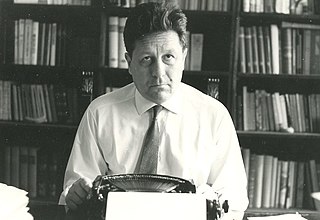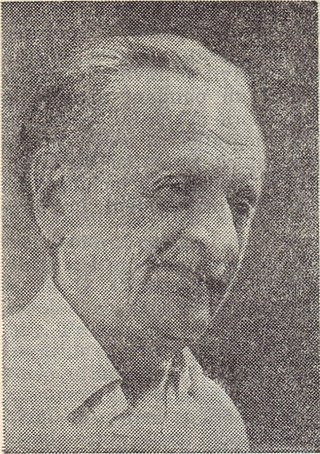Related Research Articles
The history of literature is the historical development of writings in prose or poetry that attempt to provide entertainment or education to the reader, as well as the development of the literary techniques used in the communication of these pieces. Not all writings constitute literature. Some recorded materials, such as compilations of data are not considered literature, and this article relates only to the evolution of the works defined above.

Mihai Eminescu was a Romanian Romantic poet from Moldavia, novelist, and journalist, generally regarded as the most famous and influential Romanian poet. Eminescu was an active member of the Junimea literary society and worked as an editor for the newspaper Timpul, the official newspaper of the Conservative Party (1880–1918). His poetry was first published when he was 16 and he went to Vienna, Austria to study when he was 19. The poet's manuscripts, containing 46 volumes and approximately 14,000 pages, were offered by Titu Maiorescu as a gift to the Romanian Academy during the meeting that was held on 25 January 1902. Notable works include Luceafărul, Odă în metru antic, and the five Letters (Epistles/Satires). In his poems, he frequently used metaphysical, mythological and historical subjects.
Romanian literature is the entirety of literature written by Romanian authors, although the term may also be used to refer to all literature written in the Romanian language or by any authors native to Romania.

Ion Luca Caragiale, commonly referred to as I. L. Caragiale, was a Romanian playwright, short story writer, poet, theater manager, political commentator and journalist. Leaving behind an important cultural legacy, he is considered one of the greatest playwrights in Romanian language and literature, as well as one of its most important writers and a leading representative of local humour. Alongside Mihai Eminescu, Ioan Slavici and Ion Creangă, he is seen as one of the main representatives of Junimea, an influential literary society with which he nonetheless parted during the second half of his life. His work, spanning four decades, covers the ground between Neoclassicism, Realism, and Naturalism, building on an original synthesis of foreign and local influences.

Eugen Barbu was a Romanian modern novelist, short story writer, journalist, and correspondent member of the Romanian Academy. The latter position was vehemently criticized by those who contended that he plagiarized in his novel Incognito and for the anti-Semitic campaigns he initiated in the newspapers Săptămâna and România Mare which he founded and led. He also founded, alongside his disciple Corneliu Vadim Tudor, the nationalist Greater Romania Party (PRM).
Albanian literature stretches back to the Middle Ages and comprises those literary texts and works written in Albanian. It may also refer to literature written by Albanians in Albania, Kosovo and the Albanian diaspora particularly in Italy. Albanian occupies an independent branch within the Indo-European family and does not have any other closely related language. The origin of Albanian is not entirely known, but it may be a successor of the ancient Illyrian language.

Mateiu Ion Caragiale, also credited as Matei or Matheiu, or in the antiquated version Mateiŭ, was a Romanian poet and prose writer, best known for his novel Craii de Curtea-Veche, which portrays the milieu of boyar descendants before and after World War I. Caragiale's style, associated with Symbolism, the Decadent movement of the fin de siècle, and early modernism, was an original element in the Romanian literature of the interwar period. In other late contributions, Caragiale pioneered detective fiction locally, but there is disagreement over whether his work in the field produced a complete narrative or just fragments. The scarcity of writings he left is contrasted by their critical acclaim and a large, mostly posthumous, following, commonly known as mateists.

Bulgarian literature is literature written by Bulgarians or residents of Bulgaria, or written in the Bulgarian language; usually the latter is the defining feature. Bulgarian literature can be said to be one of the oldest among the Slavic peoples, having its roots during the late 9th century and the times of Simeon I of the First Bulgarian Empire.
Vladimir Colin was a Romanian short story writer and novelist. One of the most important fantasy and science fiction authors in Romanian literature, whose main works are known on several continents, he was also a noted poet, essayist, translator, journalist and comic book author. After he and his spouse at the time Nina Cassian rallied with the left-wing literary circle Orizont during the late 1940s, Colin started his career as a communist and socialist realist writer. During the early years of the Romanian Communist regime, he was assigned offices in the censorship and propaganda apparatus. His 1951 novel Soarele răsare în Deltă was an early representative of local socialist realist school, but earned Colin much criticism from the cultural establishment of the day, for what it perceived as ideological mistakes.

Ion Heliade Rădulescu or Ion Heliade was a Wallachian, later Romanian academic, Romantic and Classicist poet, essayist, memoirist, short story writer, newspaper editor and politician. A prolific translator of foreign literature into Romanian, he was also the author of books on linguistics and history. For much of his life, Heliade Rădulescu was a teacher at Saint Sava College in Bucharest, which he helped reopen. He was a founding member and first president of the Romanian Academy.

Ruxandra-Mihaela Cesereanu or Ruxandra-Mihaela Braga is a Romanian poet, essayist, short story writer, novelist, and literary critic. Also known as a journalist, academic, literary historian and film critic, Cesereanu holds a teaching position at the Babeș-Bolyai University (UBB), and is an editor for the magazine Steaua in Cluj-Napoca.
Syrian literature is modern fiction written or orally performed in Arabic by writers from Syria since the independence of the Syrian Arab Republic in 1946. It is part of the historically and geographically wider Arabic literature. Literary works by Syrian authors in the historical region of Syria since the Umayyad era are considered general Arabic literature. In its historical development since the beginnings of compilations of the Quran in the 7th century and later written records, the Arabic language has been considered a geographically comprehensive, standardized written language due to the religious or literary works written in classical Arabic. This sometimes differs considerably from the individual regionally spoken variants, such as Syrian, Egyptian or Moroccan spoken forms of Arabic.

Mărgărita Miller-Verghy was a Romanian socialite and author, also known as a schoolteacher, journalist, critic and translator. A cultural animator, she hosted a literary club of Germanophile tendencies during the early part of World War I, and was later involved with Adela Xenopol in setting up feminist cultural venues. Her main contributions to Romanian literature include translations from English literature, a history of feminine writing in the national context, a novella series and an influential work of detective fiction. Many of her other works have been described as mediocre and didactic.

Mircea Nedelciu was a Romanian short-story writer, novelist, essayist and literary critic, one of the leading exponents of the Optzeciști generation in Romanian letters. The author of experimental prose, mixing elements of conventional narratives with autofiction, textuality, intertextuality and, in some cases, fantasy, he placed his work at the meeting point between Postmodernism and a minimalist form of Neorealism. This approach is illustrated by his volumes of stories and his novels Zmeura de cîmpie, Tratament fabulatoriu, and by Femeia în roșu, a collaborative fiction piece written together with Adriana Babeți and Mircea Mihăieș.
Horia-Răzvan Gârbea or Gîrbea is a Romanian playwright, poet, essayist, novelist and critic, also known as an academic, engineer and journalist. Known for his work in experimental theater and his Postmodernist contributions to Romanian literature, he is a member of the Writers' Union of Romania (USR), its public relations executive and the head of its Bucharest chapter. Also recognized for his contribution to Romanian humor and his essays, he has published regularly in journals such as Contemporanul, Luceafărul, Ramuri, and Săptămâna Financiară. His career in the media also covers screenwriting for Romanian television stations and the popularization of contract bridge. The author of several scientific works on engineering, Gârbea is also a faculty member at the University of Agronomical Sciences and Veterinary Medicine.

Șerban Cioculescu was a Romanian literary critic, literary historian and columnist, who held teaching positions in Romanian literature at the University of Iași and the University of Bucharest, as well as membership of the Romanian Academy and chairmanship of its Library. Often described as one of the most representative Romanian critics of the interwar period, he took part in the cultural debates of the age, and, as a left-wing sympathizer who supported secularism, was involved in extended polemics with the traditionalist, far right and nationalist press venues. From early on in his career, Cioculescu was also noted for his selective approach to literary modernism and the avant-garde, preferring to place his cultural references with Neoclassicism.

Luca Ion Caragiale, also known as Luki, Luchi or Luky Caragiale, was a Romanian poet, novelist and translator, whose contributions were a synthesis of Symbolism, Parnassianism and modernist literature. His career, cut short by pneumonia, mostly produced lyric poetry with cosmopolitan characteristics, distinct preferences for neologisms and archaisms, and willing treatment of kitsch as a poetic subject. These subjects were explored in various poetic forms, ranging from the conventionalism of formes fixes, some of which were by then obsolete, to the rebellious adoption of free verse. His poetry earned posthumous critical attention and was ultimately collected in a 1972 edition, but sparked debates among literary historians about the author's contextual importance.

Constantin Al. Ionescu-Caion was a Romanian journalist and poet, primarily remembered for his legal dispute with humorist Ion Luca Caragiale. He was a Symbolist, a disciple of Alexandru Macedonski, and a militant Francophile, as well as a leading opponent of literary tradition. His scattered work comprises essays, short stories and prose poetry, noted for their cultural references, but made little impact on Romanian literature. As a journalist, Caion prioritized scandals, accusing Caragiale of plagiarism and losing the subsequent celebrity trial of 1902, before partly recanting and winning the retrial. Despite his own coquetries with Romanian nationalism, Caion focused his verve on Transylvania's contemporary nationalist literary current.

Paul Zarifopol was a Romanian literary and social critic, essayist, and literary historian. The scion of an aristocratic family, formally trained in both philology and the sociology of literature, he emerged in the 1910s as a rebel, highly distinctive, voice among the Romanian press and book reviewers. He was a confidant and publisher of the Romanian writer Ion Luca Caragiale, building his theories on Caragiale's already trenchant appraisals of Romanian society and culture. Zarifopol defended art for art's sake even against the Marxism of his father-in-law, Constantin Dobrogeanu-Gherea, and the Poporanism of his friend, Garabet Ibrăileanu. He was also a noted censurer of neoclassical trends, of philistinism, and of inauthentic customs, advocating renewal, but not revolution. A skeptic reviewer of modernist literature, he reemerged during the interwar period as its dedicated promoter, but his preference for literary entertainment over substance and many of his literary bets were shortly dismissed by other experts of the day.
The instance that marked the shift in the whole of Arabic literature towards modern Arabic literature can be attributed to the Arab World-West contact during the 19th and early 20th century. This contact resulted in the gradual replacement of Classical Arabic forms with Western ones. Genres like plays, novels, and short stories were coming to the fore. Although the exact date in which this reformation in literary production occurred is unknown, the rise of modern Arabic literature was "inseparable" from the Nahda, also referred to as the Arab Renaissance.
References
- ↑ Solomon, Petre (2019-02-28). Paul Celan: The Romanian Dimension. Syracuse University Press. p. 189. ISBN 978-0-8156-5450-6.
- ↑ Laczo, Ferenc; Puttkamer, Joachim von (2017-11-20). Catastrophe and Utopia: Jewish Intellectuals in Central and Eastern Europe in the 1930s and 1940s. Walter de Gruyter GmbH & Co KG. pp. 296–302. ISBN 978-3-11-055934-7.